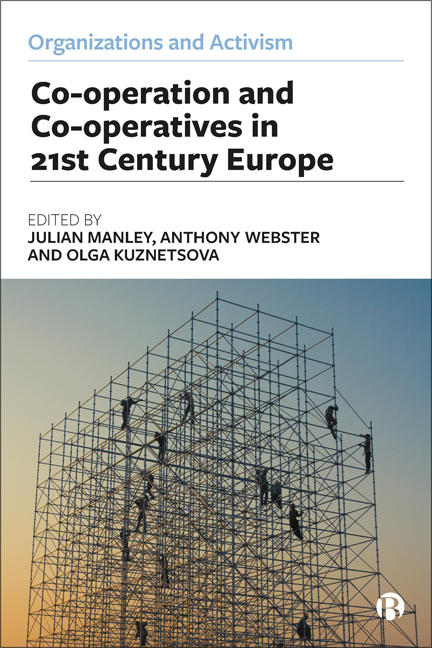Book contents
- Frontmatter
- Dedication
- Contents
- Series Editors’ Preface
- List of Figures and Tables
- List of Abbreviations
- Notes on the Contributors
- Acknowledgements
- Foreword
- 1 Introduction: European Co-operativism in a Changing World
- PART I Seeds: Identifying the Space for Co-operatives in Addressing Social Challenges
- PART II Bridges: Co-operative Culture and Education
- PART III Growth: The Preston Model, Co-operation and Community Wealth Building
- Index
4 - Exploring the Role of Worker Co-operatives in the Co-creation of Meaningful Work
Published online by Cambridge University Press: 28 March 2024
- Frontmatter
- Dedication
- Contents
- Series Editors’ Preface
- List of Figures and Tables
- List of Abbreviations
- Notes on the Contributors
- Acknowledgements
- Foreword
- 1 Introduction: European Co-operativism in a Changing World
- PART I Seeds: Identifying the Space for Co-operatives in Addressing Social Challenges
- PART II Bridges: Co-operative Culture and Education
- PART III Growth: The Preston Model, Co-operation and Community Wealth Building
- Index
Summary
Introduction
The experiences of people at work have attracted increasing interest in recent years (Taylor et al, 2017). This has been driven by numerous factors, including the impact of new technologies on jobs, the decline of trade unionism (especially in the UK), the growing casualization of work, the aftermath of the financial crash of 2008 and, most recently, the effects of the COVID-19 pandemic. All this has generated growing concern about the quality of work and its impact on the wellbeing of workers (Oswald et al, 2015). Worker co-operatives have played an important role in responding to these factors, offering secure and good quality work even in times of crisis (Roelants et al, 2012; Birchall, 2013; Berry and Bell, 2018). This has been attributed to their dual socio-economic purpose and solidarity with their community, and structural characteristics including democratic decision-making and worker ownership (Cheney et al, 2014; Peredo and McLean, 2020; Billiet et al, 2021). More broadly, there has long been strong advocacy of the ethical dimension of cooperative commercial enterprise, notably emphasizing member democracy (Rothschild, 2009), concern for the wider community and the environment (Novkovic, 2008; Mellor, 2012; Phelan, McGee and Godon, 2012), and a commitment to high standards of working conditions (Restakis, 2010; Ruccio, 2011; Carlone, 2013).
Taking two UK worker co-operatives, this chapter will explore the extent to which the experiences of worker-members differ from those working in ‘mainstream’ commercial organizations. More specifically it will explore how worker ownership and democratic member control can enable workers to put social and environmental values into practice, and through this, cocreate work that is meaningful. Drawing on secondary literature on worker cooperatives, the chapter will draw some tentative conclusions about common experiences across Europe, and the extent to which they reflect the UK examples analysed. The chapter draws upon the increasingly complex debate about what constitutes ‘meaningful’ work, and the extent to which cooperative experiences meet these definitions.
Worker co-operatives and work as a field of study
There are extensive literatures on ‘decent’ and ‘meaningful’ work, and on worker co-operatives. This section will lay out some of the key arguments and findings in these fields and will provide a wider context for the indepth studies later in the chapter.
- Type
- Chapter
- Information
- Publisher: Bristol University PressPrint publication year: 2023

